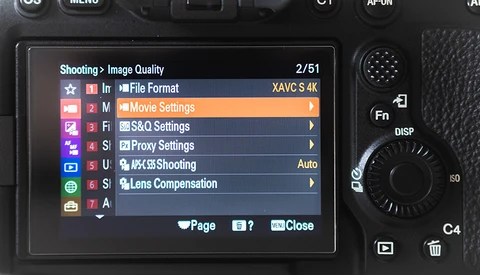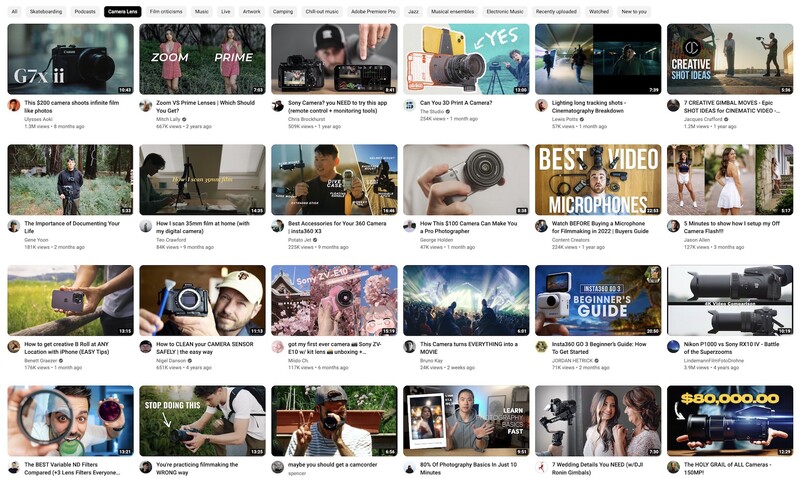

It’s no secret the camera industry is highly volatile, but the bigger story lies behind people still buying and using cameras in 2023. Whether you’re a pro or amateur photographer, the landscape is changing rapidly from year to year. As camera manufacturers increasingly prioritize video users, is the market starting to move away from photographers?
Who’s Still Buying Cameras in 2023?
It’s difficult to get reliable insights on the relative market sizes of professional and amateur camera buyers. If we use Zenfolio’s 2023 The State of the Photography Industry report as a guide, 88% of respondents consider themselves professionals in the photography industry, leaving just 12% declaring themselves as hobbyists or students.
I find it hard to believe that’s an accurate representation of the whole market, but insights from Allied Market Research support the theory that most camera buyers are professionals. They also support recent comments from Canon that both pro and amateur markets are growing, although the amateur market is growing faster.
Canon specifically mentions the “advanced amateur segment” as a key target market in 2023 and beyond.
Even more telling are comments from the major camera manufacturers, as published by DPReview. At the 2023 CP+ Expo in Yokohama, Japan, the industry leaders made one thing very clear: camera manufacturers are “laser-focused” on content creators, driving the market forward.
If the decision-makers at Canon, Nikon, etc. are right about this, their primary target market is no longer photographers, amateur or pro. Instead, they’re going after content creators who are mostly interested in video: YouTubers, vloggers, influencers, etc.
Video Driving the Camera Market Forward
If 75% of kids want to be YouTubers when they grow up, camera companies have to the content creator market seriously. The great illusion in this space is that anyone can pick up their phone and start making money from content. Of course, only a fraction will make a serious career out of this and the percentage will get even smaller as more people enter the space, but this doesn’t really matter.
When almost everyone owns a smartphone with an internet connection, the entry barrier couldn’t be much lower. You don’t need to come from a rich family, pay for years of acting school or study medicine for half a decade to enter this space; you don’t even need to be of working age.
In terms of career aspirations, content creator is the new actor, doctor, astronaut – and everything else – all rolled into one, ultra-accessible industry.
For camera manufacturers, their products will be ready for all the aspiring creators who want to step up their production quality. Of course, they’ll still be there for professional photographers, too, but we have to anticipate a change in priorities if their forecasts about the creator market materialize.
Photography as a Niche Within a Niche
In a world where most cameras are smartphones, dedicated cameras are already a niche product. If video is taking the lead, then photography is becoming a niche within a niche, and this raises a lot of questions for stills shooters. Most importantly, how much will cameras and gear, in general, pivot away from the priorities of photographers for the sake of video production?
For example, will the average camera body grow in size to allow for larger batteries, cooling fans, and video accessories? Will lenses get larger and more expensive to reduce focus breathing and other issues that mostly affect videographers? You could argue that this is already happening if you look at the latest mirrorless hybrid models and lens refreshes, especially from Sony and Fujifilm.
Camera equipment is one thing, but what about the photography market itself? Going back to the Zenfolio survey from before, the sentiment among photographers has improved since the peak of the pandemic, but the outlook isn’t great: 39.4% of photographers say business is slower than expected (down from 63.8%).
If the photography market continues to shrink while camera manufacturers profit from content creators, the shift towards video will only accelerate. Photography’s commercial value has plummeted in the digital age, despite a surge in demand for imagery. An online publishing boom didn’t do much to help, either, instead fuelling a market for stock photography.
Now, the digital publishing industry is on its knees and big names are increasingly turning to free, AI-generated visuals to fill space on their pages. At this point, it’s difficult to see the business value of photography increasing in commercial spaces.
Obviously, some types of photography are more susceptible than others. You would hope a genre like wedding photography is more robust than most, but who can guess how long people’s appetite for realism will outlive the fantasy offered by filters, composites, VR, and other technologies?
Let’s face it, reality plays such a small role in people’s projections of their lives now that we can’t overestimate its value. Not to mention the fact that, if everyone’s growing up to be content creators anyway, couples will be shooting and live-streaming their own weddings before too long.
Do Photographers Need to Follow the Market?
If the camera market is moving away from photographers, it would clearly have an impact. At the very least, it would affect the new gear options hitting the market and, by extension, it would probably change our photographic processes, to some extent.
That being said, the bigger issue is the photography industry itself. If the commercial value of photography continues to decline, fewer professionals will be able to rely on it as their sole source of revenue. At this point, pro photographers will either have to follow the market or supplement their income from elsewhere.
If the major camera manufacturers are right, following the market would mean getting more involved in video. We’re already seeing more photographers enter the “creator” space with YouTube channels, and this could become the norm for new people entering the industry.
Of course, the most important thing is that photographers continue to earn a decent living with their craft. That being said, if hoards of photographers follow the market’s move towards video, it would further devalue the pro stills market for camera manufacturers. A self-fulfilling prophecy would vindicate manufacturers’ prioritizing video and, potentially, leave amateur photographers – who don’t have the pressure of monetizing their work – as the last segment representing stills photography.
As long as the photography market remains large enough (pros and amateurs), camera manufacturers won’t be able to ignore it. The risk is that, if enough pro photographers get sucked into the video market, the stills-only market could lose its most valuable customer base.
For a long time, fear was growing that the camera market would shrink to the point that gear would become an expensive, luxury niche. Instead, it seems the camera market is leveling out, and it’s photography that’s becoming the niche, as its commercial value wanes and manufacturers set their sights on a new customer base.







24 Comments
What percentage of the world's data storage capacity is now taken up by video that no one's ever gonna look at?
Data storage is not a finite resource. The easy answer is 0%.
Exactly, 99% is crap. That's what I like about photo web sites, they spend their time looking for, hopefully better stuff, not me.
It's going to get worse, and very soon. Just wait until the "frame grab" from video files improves somewhat, and the video-centric migration will accelerate dramatically. GoPro and Apple, as well as the camera manufacturers with their live capture tech preceding the actual taking of a photo are case in point. Will this tech, once it matures, eliminate photographers? Maybe not, but who knows. It is not inconceivable that when shooting a sport event, the creative (i.e., formerly known as a photographer) may just capture a video of the whole thing and just pick and choose the frames to be turned into photographs. And even then, these photos may never get as many views as the actual video in YouTube. Such is the world we're moving to, and at a very high speed.
Even the term "creatives" is being rapidly replaced with "content creators." I'm sure there are folks already working on "AI" systems to pick those key frames out of a video.
There are indeed. A taste of such brave new world? https://fstoppers.com/reviews/review-automated-blog-generator-focal-640…
I'd say "Keep calm a carry a Leica".
True, it’s very possible manufacturers might phase out stills and amateur based photographers. Every industry wants to appeal the free publicity of their newest product. Market for each photographer is really what they want to make of it. Sometimes we have to be genuine to who we want to be with ourselves and the market we create whether it’s through YouTube or our local communities. The photography industry is being bombarded with lots of new content creators that could have an impact on monetization for some photographers. It won’t be long before cameras are phased out with cell phones. I believe that’s the next phase of the development of this industry, but sometimes we just have to remember why we started in photography in the first place. Which to me is just take photos that we like and be in an environment of peace, quiet and in nature viewing landscapes. AI can’t inspire the feeling of a photo. My two cents. Good article.
I don't think that cell phones will replace cameras. The sensor size is prohibitive, and the lens quality is very poor. To quote Simon Sinek, adding a camera to a phone is not innovative, it is novel. It's like a wrist watch TV. It sounds way cooler than it actually is. The real innovation in phone photography is in the software. Creating HDR through the use of multiple lenses is clever; however, it is not hard to pic the phone camera images out of a line up. Consider that 70 - 80% of the features in modern cameras are targeting amteur photographers. Professionals are more apt to shoot manual over whatever landscape, moonlight, priority, auto settings the manufacturer has cobbled on top. Professionals don't need to upgrade their cameras often, but camera manufacturers have bottom lines. It makes perfect sense that they court video centric consumers. Why wouldn't they?
I am a hobbyist, however I have the gear to do what I need. I still use a Canon EOS R because it does what I need. I only use my cellphone when getting the shot quickly matters or if I am planning to shoot somewhere I can shoot the area to figure out the composition that I want. I don't do much video. Lense choice is also important for me. I am not going to try and shoot wildlife 1000 yards away with my camera. I have used it on occasion when I am filming short segments for family outings.
I completely agree, you can spot cell phone pics any day if the week. However, the iPhone 15 now has the ability to reach 120mm focal length. In a camera! Apple looks at the market and will try to continue to take the clients with a lower budget away from the higher end manufacturers. And that’s the impact it will have. I’m always shooting in manual. Odd time in shutter priority, but I get your point. Jus saying cell phones are bridging the gap.
None of this matters to amateurs.
Really? Why? There is always the right tool for the right job. I still don't think that small sensor cameras are good enough for many things I do as a amateur/hobbyist.
Of course it does. Amateurs buy their cameras from the same companies as pros
I have been conditioned by history and time to believe that no video could ever be as iconic as a great photo. But that's not really true, so unless I embrace my inner content creator, I will have become a fossil of a bygone era. Anyway, it is very apparent that video content creation is the primary focus and direction of consumers in the market for cameras / drones / related devices and accessories. So it seems to me that those in the market for dedicated devices are looking especially at video specs and capabilities. Meanwhile I feel like an outlier, a photographer clutching his 61 Mpx stills camera with loving affection while everyone else has embraced something with far greater video capabilities. In the end if you do this for a living (I don't), you have to go where the income stream is.
Photography and video are kinda like books: some have very little worthwhile content and can be gleaned of it quickly, while others contain wisdom, relevance and beauty in every word, sentence and paragraph, requiring a careful reading and oft revisiting. Video lends itself better to the former and photography to the latter, even though there are abundant examples of both applying to the other.
The answer is in the sales. Three years after the release of the R5, the 5dm4 is still available as well as the 1dxm2 and 1dxm3. Yes low volume, yes many don't need video and decided so far to not go for products that don't fit their expectations. I don't think many saw that come, especially Canon.
Absolutely. Sales are the biggest factor and we may have to accept companies moving in another direction if we want them to survive
Despite my dislike for it, technology has already leapfrogged past this. Most family portraits will be AI in a few years. Book it.
I think we already have about 1,000 times more "content" than we can consume. We don't need more "content creators", we need "meaning creators".
I think camera companies will disagree
I get the distinct impression you're talking like commercial photography is the only kind of photography that matters.
Not at all
This is for sure an issue, but I see (in real life) more and more people that you know nothing about, they are noway interested in content creation or Instagram or anything, that just take pictures and buy cameras too. It's for sure a smaller amount but they exist, and I hope products will keep being available...I run a darkroom here and I am surprised from how many people ask me for having a space to use...just as an example. Then, as many already commented, most of those creations are total useless and those acts will dissolve in general indifference. Less is more.
While manufacturers are trying to bring innovation for the health of their bottom line ...
... and they concentrate on the video needs of content creators ...
... the level of innovation for us still photographers is going down. So my oldish gear is still mostly current and I don't have to buy a new kit every other year. Good for me, for the moment, but not so good for the industry. In the longer run, though, when I'll need a new kit, they might not have anything to sell to me.
(It is like the CD player of my old friend that started failing - I couldn't find a CD player; everyone suggested I should just get a DVD player. And now - another few years later - I wonder: Does anyone still make those?)